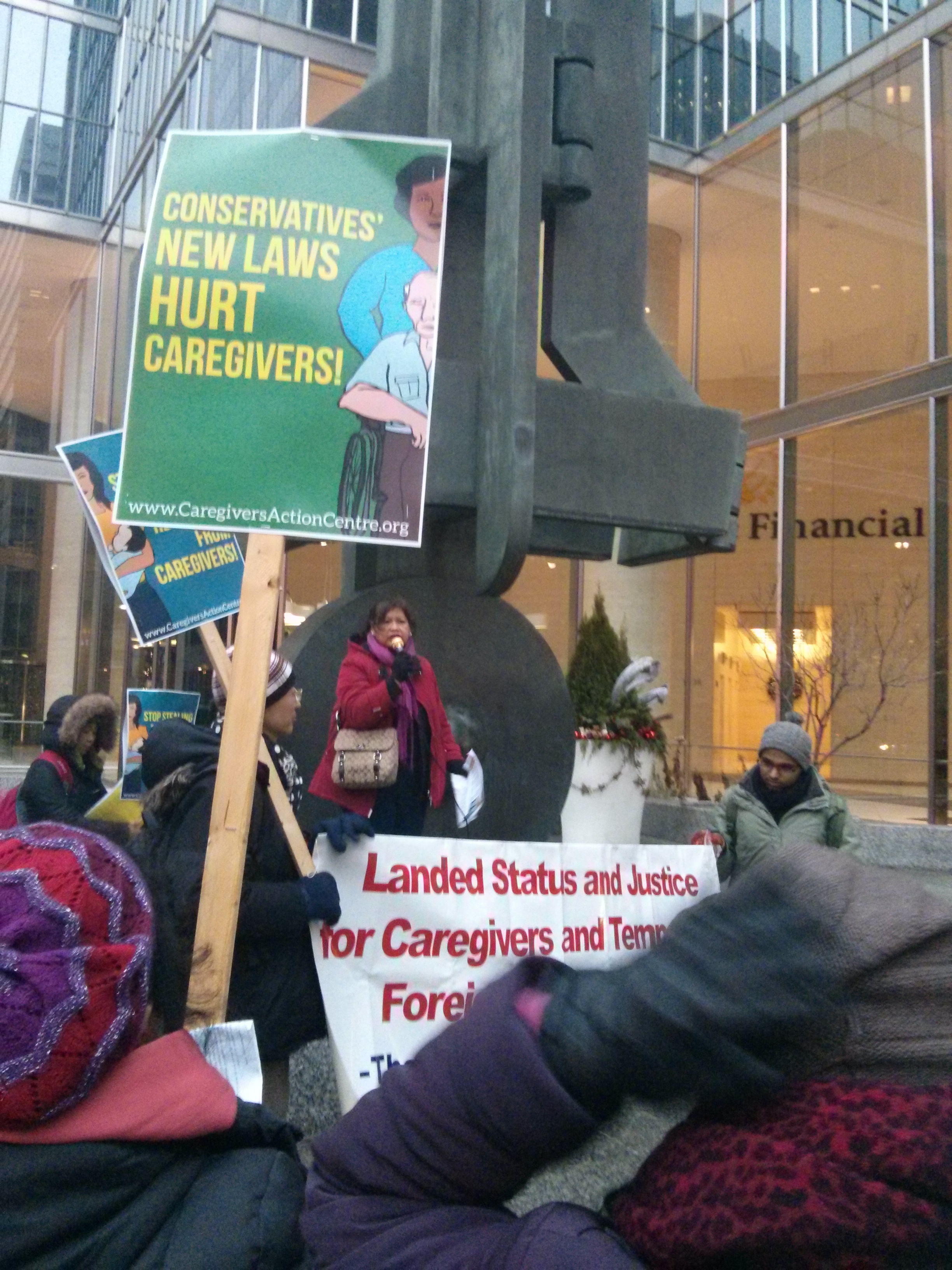On November 22, 2014, caregivers and their allies gathered in front of Citizenship and Immigration Canada’s offices in downtown Toronto to protest the provision of caps to the numbers of caregiver entries to Canada and new language and licensing requirements for caregivers.
Brandishing placards stating “Conservatives’ New Laws Hurt Caregivers” and “Stop Stealing Permanent Residency from Caregivers,” those present were unanimous in their belief that the new changes hurt caregivers and that caregivers deserved landed status upon arrival.
During the rally, Caregiver Action Centre’s Johnna Anipuesto argued that “caregivers should not back down in the fight for permanent residency.” Long-time caregiver activist Coco Diaz concurred, adding that she has been fighting for landed status upon arrival for caregivers for 30 years. She drew attention to how improvements to Canada’s migrant domestic worker programs, which include getting the opportunity to apply for permanent residency in 1981, occurred only because domestic workers fought for this right.
Immigration Minister’s changes to caregiver program harm caregivers
Caregivers expressed their frustration with Immigration Minister Chris Alexander and at different points during the rally chanted, “Chris Alexander, you cannot hide, we can see your racist side.”
Multiple speakers imparted a personal message to the Minister, asking him to treat them with “dignity and respect” to “stop telling lies” and to “stop duping Canadian families and the Filipino-Canadian community.”
The speakers additionally discussed why changes to the caregiver program were harmful.
Gabriela-Ontario’s Petronila Cleto states that making it optional for caregivers to live with their employer was insufficient to protect caregivers from abuse because “caregivers’ visas are still tied to their employers and so employers still have immense power over caregivers.”
Anipuesto adds that Minister Alexander’s promise to process 17,500 caregiver applications for permanent residency in 2014 and 30,000 in 2015 was clearly an attempt to curry votes among the Filipino-Canadian community in the upcoming 2015 federal elections. “We are not so easily bought. This is not something caregivers should feel gratitude for since it is the Canadian government’s obligation to process these applications and it is their fault that the backlog existed in the first place.”
Also at issue for the caregivers were the restrictions to caregivers’ entry into Canada.
The changes Minister Alexander announced on October 31, 2014 divide the caregiver program into the child care stream and the high-medical needs stream. The former caps the entry of in-home child-care providers to 2,750 per year and mandates that caregivers pass CLC level 5 in order to get permanent residency. The latter also caps the entry of caregivers to 2,750 per year but additionally requires that caregivers pass CLC level 7 and receive professional licenses either as Personal Support Workers, Registered Nurses, Licensed Practical Nurses and Registered Psychiatric Nurses to qualify for permanent residency.
That only 5,500 caregivers are going to be allowed entry into Canada per year compared to previous years, which saw a peak of 12,930 caregiver entries in 2007 was an additional point of concern. “Clearly, these are gatekeeping mechanisms,” Caregiver Action Centre’s Pura Velasco notes.
Furthermore, caregivers criticized the onerousness of these requirements. Professional associations like the Ontario College of Nurses only give a limited number of foreign-trained nurses licenses each year. The high costs associated with getting their educational credentials assessed and with meeting the academic requirements needed to be licensed present additional barriers for caregivers.
“This means most caregivers will be forced to qualify for [permanent residency] under the first stream. The creation of a second high-medical needs stream also increases deskilling and deprofessionalization. Why are foreign-trained nurses, who in the past used to qualify for entry into Canada as landed immigrants, now being placed in the caregiver program? The Canadian government wants superwoman to take care of Canadian families but refuses to give them good wages and security of status in return,” Diaz asserts.

Caregivers and allies form ‘Justice for Caregivers’ Coalition to fight for caregivers’ rights
Organized by Anakbayan, Bayan, Binnadang, Caregivers Action Centre, Filipino Christian Fellowship, Gabriela, IWWorkers, Migrante Canada, Migrant Workers Alliance for Change, the Workers Action Centre and Parkdale Community Legal Services, the rally was an opportunity for different organizations to form a broad coalition of support for caregivers’ rights.
Although their agendas, activities and long-term goals differed, members of these groups agreed that it was important to present a united front in order to reverse the changes and to get landed status for caregivers.
Members of the alliance will be holding outreach sessions for caregivers to counter what they believed to be misleading messages from the Conservative government. They also intend to join other coalitions for caregivers’ rights that have been formed in other parts of the country.
Federal government representatives did not respond to requests for comment.
Ethel Tungohan is a community activist and a Grant Notley postdoctoral fellow at the University of Alberta.
Photos courtesy of Ethel Tungohan



